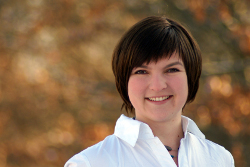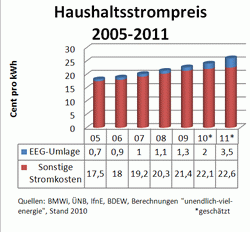e-News
Welcome to the e-News of the Planning Association Here you can find our latest news of all energy and environmental issues. Exclusively and at no charge you receive first-rate information. If you have questions or comments, please contact us via
info@planungsgemeinschaft.de
| Date |
News 4/2012 |
|
| 09.05.2012 |
Sustainable energy from brazil |
A major honour for a partner of the Projekt group: At the end of April, the Brazilian energy cooperative CRELUZ received the "38th International Arch of Europe Award" in recognition of its creation of a sustainable energy supply in a rural area. The Managing Director of Ecoprojeto Ltda., Mara Frey Rockenbach, travelled to Frankfurt for the awards ceremony together with the two CRELUZ Directors Valdari Pedro Batisti and Clenio Alberto Lovis Trentin. On their way, they stopped off in Oldenburg for talks and visits to the Projekt companies and aleo solar AG.
Ecoprojeto Ltda., the Brazilian subsidiary of the Projekt group, cooperates with the CRELUZ cooperative in the state of Rio Grande do Sul. Both are partners in the "Coopervento" cooperative venture founded by Ecoprojeto. Coopervento is dedicated to driving forward the development of wind energy in the region in southern Brazil. Recently, the cooperative erected a 102-m wind measuring mast in Giruá. Ecoprojeto will use the mast to carry out wind measurements that will provide a solid basis for an analysis of the economic viability of the jointly planned wind farm.
With the "International Arch of Europe Award", CRELUZ was commended for its work in creating a high-quality, sustainable energy supply in a rural area. CRELUZ supplies the region through its more than 4,500-km-long grid with energy from its six hydropower stations (4 MW). It supplies electricity at reduced prices or free of charge to poorer people.
During their trip, which was recorded by a reporter from Brazilian TV station RBS-TV, the Brazilian partners met the Managing Directors of the Projekt group, Heike Kröger und Ubbo de Witt, in Oldenburg. They talked about current developments and projects. The companies pursue the same strategy with their investments in sustainable energy and reforestation projects.
Also part of the programme were tours of one of the prototype wind turbines of the Projekt group on the DEWI test field in Wilhelmshaven as well as the solar farm on a former air force base in Oldenburg. Solar energy was also at the centre of a subsequent talk with York zu Putlitz, the Chairman of aleo solar AG. Ubbo de Witt expressed his satisfaction, saying: "The talk was very promising. So far, aleo has had no involvement in South America. However, the globally operating company is extremely interested in entering the Brazilian market with a reliable partner." The Projekt group with its Brazilian subsidiary could provide effective support here. A possible model project has already been tabled: CRELUZ is looking for a partner for an initial solar project on its office building.
|
|
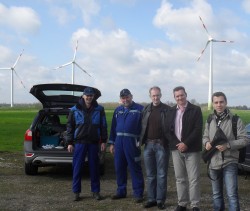
Visit to the DEWI test site in Wilhelmshaven: Andreas Buhmann and Ralph Müller of the project group to show the guests the Brazilian offshore test facility Bonus 2 MW 70.
|
|
| Date |
News 3/2012 |
|
| 27.04.2012 |
Price reduction due to renewables |
"The transformation of the energy system is feasible and pays off". That is the main conclusion of a fundamental study commissioned by the Federal Ministry for the Environment, Nature Conservation and Nuclear Safety (BMU) on the expansion of renewable energies in Germany that was published at the end of March. The study was conducted by DLR (Stuttgart), Fraunhofer IWES (Kassel) and IfnE (Teltow).
The findings on the economic effects of the transformation are: "Renewable energies are currently still more expensive than coal, oil and gas. However, while the prices of coal, oil and gas are likely to continue to rise in future, renewables will become ever cheaper." That means investment here will quickly and thoroughly pay off - also in terms of saving resources and protecting the environment.
In a scenario "that fully reflects the sub-goals of the federal government"s energy policy resulting from the overall goal of reducing greenhouse gases by 80% by 2050 (compared to 1990)", the price development shows that the initially high investments will quickly produce an economic "yield" (see BMU graph):
The prime costs of conventional power stations are increasing steadily and consistently. The mean generation costs of renewable energies in the development phase are much higher and increase more steeply, but already, in 2012, they have reached their peak and will fall significantly. From 2027 they will be lower than the costs for conventional energy. From then onwards the mean costs will also decline due to the growing share of renewables in the energy supply mix - 2010: 17%; 2027: 50%; 2050: 85% -; from around 2040 they will be lower than today.
Summing up, the main conclusion of the study is that in all scenarios the political goals of expanding renewable energies will definitely be achieved if "the basic principle of the priority of renewable energies remains largely in place unchanged". Ubbo de Witt of the Projekt group of companies says: "The government must demonstrate dependability here. Market structures are changing radically within a short time. Medium-sized, flexible companies have driven the establishment, further development and adjustment of the market. It is important to ensure this development does not stall. As the BMU study shows, the Renewable Energies Law (EEG) is and remains the most effective instrument for promoting the expansion of renewables in the electricity sector!".
PDF of the study (in German): Langfristszenarien und Strategien
für den Ausbau der erneuerbaren Energien in Deutschland
bei Berücksichtigung der Entwicklung in Europa
und global |
|
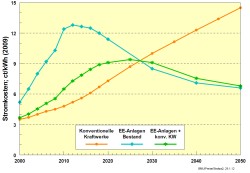
Mean electricity prime costs for conventional power stations (yellow), the renewable energies mix (blue)
and the total of all power generating plants (green).
(Source: BMU study, Figure. 7.13; Scenario 2011 A for energy price development according to price path A)
|
|
| Date |
News 2/2012 |
|
| 13.03.2012 |
Lessons from Fukushima |
Cost explosion due to delay in use of renewable energies
How quick it is to pull out of nuclear energy - in Japan! There, 52 of 54 commercial reactors are no longer in the grid. The last two are due to go offline in April. Before the nuclear accident a year ago, the country generated around a third of its electricity from nuclear power and planned to increase the share to over 50 percent by 2030. The price for this energy policy is now being paid in the form of a record trade deficit. The costs of energy imports are almost 30 percent higher than those of the previous year. This cost explosion results from the earlier failure to invest in renewable energies.
In contrast, the share of renewables in the energy mix in Germany was around 20 percent last year. After the shutdown of eight nuclear power plants in early 2011, renewables exceeded nuclear power (Federal Government, 02/2012). "In Germany in the first two months of this year, wind and solar energy plants alone generated more electricity than all eight closed down nuclear power plants in Germany could theoretically have generated in this period" says Norbert Allnoch of the IWR (an institute of the renewable energy industry) in Münster.
Despite the pullout from nuclear, the stock market price for German electricity is significantly lower than it was a year ago. Specifically, the price for German base-load electricity on the electricity exchange dropped to an average of 4.74 cents per kilowatt hour (kWh) in the first two months of 2012. As the IWR announced after the release of the February figures by the European Power Exchange (EPEX/EEX), the electricity price is therefore 6.1 percent lower than in the comparison period of the previous year. At the beginning of 2011, when the decommissioned nuclear power stations were still in production, the price was 5.05 cents per kWh.
In January 2012, the high generation of wind power meant that the price for German electricity on the spot market fell to as low as 3.99 cents per kWh, the lowest rate since August 2010. Despite this, prices for energy increased in January 2012 by 1.9 percent compared to December 2011 (Federal Statistical Office, 02/2012). "Unfortunately, in 2011 industrial and large customers were protected at the expense of private electricity customers. This is why utilities have announced electricity price increases for 2012", says Ubbo de Witt, Chairman of Oldenburger Energie AG (EAG). Against this background, the company is committed to working toward 100 percent renewable energy, regional value creation as well as stable and transparent costs.
The German government subsidises more than 1,500 energy-intensive companies and large consumers by exempting them to a large extent from the Renewable Energy Levy and from network charges to the tune of one billion euros in total.
The latest news from Japan that planning will start in March on an offshore farm - located off the coast of Fukushima - that will supply 100,000 households with clean energy is a further sign of the rejection of nuclear folly and its costs.
|
|

Decreasing stock market price for German electricity at the European Power Exchange (EPEX/EEX) EEX. Market data from 12th March 2012.
More information: www.eex.com
|
|
| Date |
News 1/2012 |
|
| 10.02.2012 |
New Projekt corporate spokesperson |
Maike Behrendt, 32, is the new corporate spokesperson of the Projekt group in Oldenburg. In this function, she acts as a link between the outside world and the companies Projekt GmbH, Projekt Ökovest, and Oldenburger Energie AG (EAG), the new group member founded in September 2011. This makes Mrs. Behrendt responsible for the external presentation of the group and its first contact for the press. Also included in her tasks are supporting the management and advising the subsidiaries. Previously, the Cultural Scientist spent three years as the managing director of the OLEC company network.
"I"m excited about representing an innovative group that applies the know-how it"s gained over many years to sustainable development," says Behrendt. This commitment extends beyond the core business of project planning for offshore and onshore wind farms as well as regenerative energy plants. The latest example here is construction of an office building to passive-house standards.
|
|
|
| Date |
News 10/2011 |
|
| 25.11.2011 |
Sandbank Power sells "Sandbank 24” |
Oldenburg company Projekt GmbH has been developing the offshore wind farm project "Sandbank 24” since 2001. This included planning and development, gaining official permission for the construction of 96 wind turbines and, since 2005 as a shareholder in Sandbank Power GmbH & Co. KG, preparing everything for the start of construction. Furthermore, an application for planning permission for another 40 wind turbines for the "Sandbank Extension” was drawn up and submitted.
Now the company has signed a contract with Vattenfall for the sale of both projects. Vattenfall is the owner of the "Dan Tysk” wind farm in the direct vicinity of "Sandbank 24” to the west of the island of Sylt in the "SylWin” cluster. Now, Sandbank Power GmbH & Co. KG and Vattenfall as the purchaser wrapped up the deal.
With its 96 wind turbines, "Sandbank 24” is currently the offshore wind farm with the largest approved pilot phase in Germany, and a further 40 turbines could be added to that when "Sandbank Extension” is approved. Purchaser Vattenfall expects the first stage to achieve a capacity of up to 576 megawatts (MW) on a site 90 km west of the island of Sylt – added to its "Dan Tysk” wind farm, scheduled for construction start in 2012.
The purchase by Vattenfall is also a recognition of the excellent development work of the Oldenburg Projekt GmbH, which in 2004 obtained the construction approval for "Sandbank 24” from the German Federal Maritime and Hydrographic Agency (BSH), in 2007 was able to increase the number of wind turbines to a total of 96, and in 2009 achieved the first approval according to the BSH standard "design structure of wind energy turbines”.
That makes "Sandbank” a solid investment for Vattenfall, especially as the contracting parties already have a history together. They jointly worked on the offshore wind energy cluster "SylWin”, on aspects including operation & maintenance (O&M) and technical project development. At the beginning of 2011, the network operator TenneT placed an order for a converter station for 864 MW in the "SylWin” cluster – the largest joint grid connection commissioned so far.
Even after the sale, Projekt GmbH will be involved in a consultancy role in the "Sandbank 24" project. Managing Director Ubbo de Witt commented: "We're delighted that we will be able to support Vattenfall, one of the largest offshore wind farm operators, with our know-how during the further development of the project." As part of its own offshore activities, the company is now preparing the offshore wind farm "Witte Bank" for official approval.
|
|
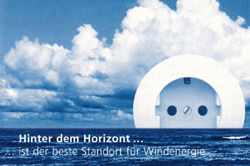
"Beyond the horizon ... ist the best place for wind energy": Illustration and slogan of Sandbank 24
|
|
| Date |
News 9/2011 |
|
| 25.11.2011 |
BWE values company"s expertise |
Roland Hagendorff of Projekt GmbH has once again been elected as a speaker for the working group "Marking wind energy turbines" of the German Wind Energy Association (BWE). He brings to the office his expertise in the area of offshore wind energy turbines.
The goal of the working group is to cooperate with the responsible government departments, flight security organisations and experts to find solutions for new, more efficient marking systems. These are necessary because of ever-taller towers, but must also respond to environmental concerns. Right now, discussions focus on ways of activating lighting on demand, using either radar or transponders in aircraft.
The speakers" group of the Marking WG regrets that the systems envisioned with the aim of increasing acceptance will first be tried out abroad. The first primary radar system developed, "OCAS", was shut down by the German Network Agency due to frequency overlaps with military radars, so now an initial wind farm is due to be equipped with "Cassidian" modules at the end of 2012. In order to promote the transponder solution, the WG also demands a general "night-time transponder obligation".
Roland Hagendorff has in the past cooperated on various BWE projects, including the HIWUS study "Development of an Obstacle Lighting Concept to Minimise Light Emissions from Onshore and Offshore Wind Energy Farms and Turbines, with Special Reference to the Compatibility of Environmental Requirements and Air and Marine Traffic Safety". He also sits on the BSH"s "Protection and Safety Strategy" working group.
|
|
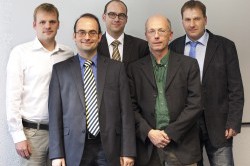 The speakers" group of the "Marking" working group (left to right): Arne Magnussen, Oliver Frank (spokesperson), Thomas Herrholz, Roland Hagendorff (Projekt GmbH) and Stephan Harms (photo: Bundesverband WindEnergie e. V.)
The speakers" group of the "Marking" working group (left to right): Arne Magnussen, Oliver Frank (spokesperson), Thomas Herrholz, Roland Hagendorff (Projekt GmbH) and Stephan Harms (photo: Bundesverband WindEnergie e. V.)
|
|
| Date |
News 8/2011 |
|
| 11.11.2011 |
Projekt GmbH supports KOSTBAR 2012 |
"Regional”, "organic” and "fair” are the three key words that can be used to describe a sustainable lifestyle. Promoting these values is the express aim of the "buying and activity guide” KOSTBAR, available for 2012 for the second time with special offers in Oldenburg and the region.
The idea was an immediate success, so now there"s even more demand for the new issue. It contains more than 170 vouchers for discounts on food products from the region, organic and fair-trade goods, and leisure activities available locally. What"s more, over 90 companies, sports clubs and others provide a review of what they have to offer.
The 264-page book gives readers systematic information and ideas on how to explore options of greener consumption to save both money and CO2 while simultaneously boosting the regional economy.
Projekt GmbH supports the climate protection book created by the association "transfer” because it reflects the objectives of our group. We also contribute with our promotion of renewable energies to a sustainable use of the world"s resources.
|
|
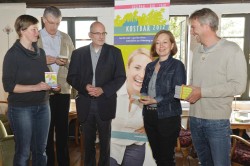
Presentation of KOSTBAR 2012 with Ubbo de Witt (Projekt GmbH, right) as sponsor.
|
|
| Date |
News 7/2011 |
|
| 04.11.2011 |
Keeping consumers in the dark! |
Since the decision to decommission nuclear power stations, there have been more and more forecasts of electricity price increases, something that already tends to be reported frequently towards the end of each year. It"s important to examine closely who is claimed to be responsible for this.
Above all the large grid operators like to represent renewable energies as the main cause of price rises, although it has repeatedly been proven that they do not pass on lower energy prices to consumers (see e.g. http://www.sueddeutsche.de/geld/strompreis-energiekonzerne-zocken-kunden-ab-1.983198), instead using electricity price rises to increase their profit margins.
Exemption from the obligation to pay network charges is often used as a way of avoiding costs. For instance, in January the German Association of Energy and Water Industries (Bundesverband der Energie- und Wasserwirtschaft BDEW) repeated its "recommendation" for an exemption of electricity storage technologies from the obligation to pay network charges with a terse reference to the "low effect on households" e.g. in the case of pumped storage plants, as the sums involved only totalled the "very small share" of € 95 million per year.
The German Network Agency even states that there is a "trend towards introducing subsidies in the form of a complete or partial exemption from network charges" and warns that "all other network users must always pay for this through higher network charges".
Recently, the German government made a gift to electricity-intensive industries. Companies with a consumption of more than 10 million kilowatt-hours per year are exempted from network charges. According to "Monitor" news programme broadcast on 27 October, this amounts to a saving of € 1.4 billion!
Internet product comparison portal Verivox - rated "very good" by Stiftung Warentest consumer advice organisation - expects an average electricity price hike of four percent at the end of the year. After analysing the factors, Verivox criticises the "continued unclear situation regarding network charges and the individual price policies of the various utilities" - this is where the danger of deceit lies, not in the development of the levies according to the EEG (Renewable Energies Law).
|
|
|
| Date |
News 6/2011 |
|
| 05.10.2011 |
EAG Oldenburger Energie AG founded |
The group of companies associated with Oldenburg-based Projekt GmbH has founded a public limited company to push for the expansion and application of renewable energies at its own location.
The background is the new broad consensus in society that energy supply needs to be restructured. People are no longer asking whether a 100% coverage of regional demand with renewables is possible - the only question now is how and how quickly this can be done. Climate protection urgently demands that this process is accelerated, and that will also create added value and jobs in the region.
EAG Oldenburger Energie AG has been established to create and improve the scope for investing and offering financial participation in the field of renewable energies.
|
|
|
| Date |
News 5/2011 |
|
| 19.09.2011 |
Restructuring of the Projekt group |
The company group consisting of Projekt, Projekt Ökovest and b-Experts is launching its "Project Future" simultaneously with a relocation to a new home at the end of October. The foundation of a new company and an expansion of activities creates the ideal opportunity to hire new employees and bring everything together at one location. The most visible expression of the revamped company structure and scope is a new group corporate design that covers the entire public presentation and corporate communication of the group.
Already, the latest new employee is busy helping set up the infrastructure for the new office building. She is a trainee in IT for systems integration, and on 15 August started a dual apprenticeship at Projekt GmbH and iS information Systems oHG (as the main company). That makes Projekt GmbH a training company for the first time.
The total of some 20 employees now have plenty of space in two houses, each with around 600 m2 of useful space. They can make the most of ideal conditions with optimally equipped work places and spacious meeting rooms. It all means they can work in teams even more effectively to successfully implement projects like the offshore wind farm "Sandbank 24", and now also "Witte Bank". These are projects with an unusually large volume for a company of this size.
Not long after the foundation of Projekt-GmbH in 1993, the company seat in Alexanderstraße became too small. An extension was built, then, in 2003, the technical management moved into the Technologie- und Gründerzentrum (TGO - Technology and Start-up Centre). That was when the company group owned by Heike Kröger and Ubbo de Witt built their future-oriented headquarters in Alexanderstraße 404 a & b. It consisted of two three-storey passive-energy houses built on wooden frames. An underground car park with 25 places left room for a landscaped garden instead of paved grounds.
The company signs on the new buildings will display the new corporate design for the first time. It was developed by Oldenburg design and communications company "Ideendirektoren" to enable the group to clearly present its extended corporate structure and scope of activities to the market.
|
|
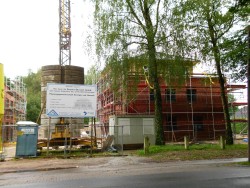
The new buildings of the Projekt group at the Alexanderstraße.
|
|
|



